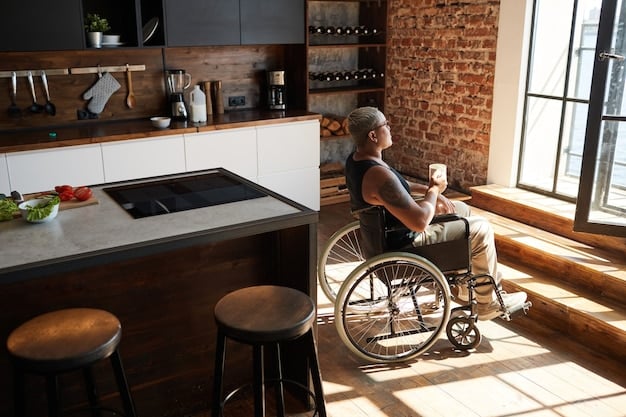Understanding Special Needs Housing: Group Homes vs. Supported Living vs. Independent Apartments

Special Needs Housing Options: Comparing Group Homes, Supported Living, and Independent Apartments assists families in finding suitable living arrangements for individuals with special needs by exploring the characteristics, benefits, and considerations of each housing type.
Finding the right housing solution for individuals with special needs can feel overwhelming. This guide, Special Needs Housing Options: Comparing Group Homes, Supported Living, and Independent Apartments, breaks down the complexities, empowering you to make informed decisions that best suit your loved one’s needs and promote their independence.
Understanding the Spectrum of Special Needs Housing
Special needs housing encompasses a range of living arrangements tailored to support individuals with disabilities. These options vary significantly in the level of care, independence, and social interaction they offer.
Key Considerations Before Choosing a Housing Option
Selecting the right housing environment requires careful consideration of several factors, including the individual’s level of independence, required support services, social preferences, and financial resources.
- Individual’s Needs: Assess their cognitive, physical, and emotional needs.
- Level of Independence: Determine their ability to perform daily tasks independently.
- Support Services: Identify necessary medical, therapeutic, and personal care services.
- Social Preferences: Consider their desire for social interaction and community involvement.
By carefully evaluating these considerations, families can better navigate the diverse landscape of special needs housing and identify the most suitable option for their loved one.

Ultimately, the best housing option will empower the individual to live as independently and fulfilling a life as possible, while receiving the necessary support to thrive.
Group Homes: Community and Support in a Shared Setting
Group homes offer a structured living environment where a small group of individuals with similar needs reside together under the supervision of trained staff. The emphasis is on fostering community and providing consistent support with daily living skills.
Benefits of Group Home Living
Group homes provide a sense of belonging, consistent care, and opportunities for social interaction. The structured environment can be especially beneficial for individuals who require significant support with daily tasks and decision-making.
- Social Interaction: Reduced risk of isolation through planned group activities and companionship.
- Structured Environment: Consistent routines and supervision promote predictability and safety.
- Skill Development: Staff assistance with daily living skills, such as cooking, cleaning, and personal hygiene.
- Community Integration: Opportunities to participate in community events and access local resources.
While group homes offer numerous advantages, it’s crucial to consider that the level of independence is often lower compared to other housing options, and residents may have limited control over their daily routines.
Group homes can be an excellent option for individuals who benefit from a structured environment and thrive on social interaction, providing them with the care and support they need to live fulfilling lives.
Supported Living: Balancing Independence with Assistance
Supported living arrangements offer a middle ground between group homes and fully independent living. Individuals reside in their own apartments or houses, receiving individualized support services tailored to their specific needs.
The Flexibility of Supported Living Services
Supported living provides a personalized approach, allowing individuals to maintain a higher degree of independence while accessing assistance with tasks they find challenging. The level of support can be adjusted as the individual’s needs evolve.
Services offered in supported living arrangements can include:
- Medication Management: Assistance with medication reminders and administration.
- Personal Care: Support with bathing, dressing, and grooming.
- Transportation: Help with accessing transportation to appointments and activities.
- Financial Management: Guidance with budgeting and paying bills.

Supported living empowers individuals to develop greater self-sufficiency and control over their lives while ensuring they have access to the support they require.
Supported living bridges the gap between group homes and independent living, providing a flexible and tailored approach that promotes independence and self-determination.
Independent Apartments: Fostering Autonomy and Self-Reliance
Independent apartments are designed for individuals with special needs who possess a high degree of self-sufficiency and require minimal support. These apartments provide a private living space where individuals can manage their own affairs and pursue their personal goals.
Criteria for Successful Independent Living
Successful independent living requires strong self-management skills, the ability to handle daily tasks independently, and access to community resources. Individuals should also have a support network in place to provide assistance when needed.
Before considering independent living, it’s important to assess the individual’s:
- Self-Care Skills: Ability to manage personal hygiene, dressing, and grooming.
- Household Management: Capacity to perform basic household tasks, such as cooking, cleaning, and laundry.
- Financial Literacy: Understanding of budgeting and managing finances.
- Problem-Solving Skills: Ability to identify and resolve challenges independently.
Independent apartments offer a pathway to greater autonomy and self-reliance, allowing individuals to live with dignity and pursue their aspirations.
For individuals with the necessary skills and support system, independent apartments provide the opportunity to flourish in a self-directed living environment.
Navigating the Financial Aspects of Special Needs Housing
Funding and financial assistance options play a crucial role in determining the accessibility of different housing arrangements for individuals with special needs. Understanding available resources and eligibility requirements is essential.
Exploring Funding and Assistance Options
Several funding sources can help offset the costs of special needs housing, including government programs, private insurance, and charitable organizations. Families should research and explore all available options to maximize financial support.
Common funding sources include:
- Social Security Disability Insurance (SSDI): Provides income support to individuals with disabilities who have a work history.
- Supplemental Security Income (SSI): Offers financial assistance to low-income individuals with disabilities.
- Medicaid Waivers: Cover the cost of long-term care services, including housing and support services.
- Private Insurance: Some insurance policies may cover a portion of the costs associated with special needs housing.
Navigating the complexities of funding and financial assistance requires persistence and a thorough understanding of eligibility criteria.
By exploring all available funding sources, families can increase their ability to access appropriate and affordable housing options for their loved ones with special needs.
Making the Right Choice: A Personalized Approach
Ultimately, the decision of which housing option is best depends on a multifaceted evaluation of the individual’s unique needs, preferences, and resources. A personalized approach that prioritizes the individual’s well-being and fosters their independence is paramount.
The Importance of Person-Centered Planning
Person-centered planning involves actively engaging the individual, their family, and their support team in the decision-making process. This ensures that the housing arrangement aligns with their goals, values, and aspirations.
A successful person-centered plan should:
- Identify the Individual’s Strengths and Needs: Focus on their capabilities and areas where they require support.
- Establish Clear Goals: Set realistic and achievable objectives for independent living.
- Develop a Support Plan: Outline the necessary services and resources to achieve the goals.
- Regularly Review and Adjust the Plan: Ensure the housing arrangement continues to meet the individual’s evolving needs.
The choice of housing should empower the individual to live a fulfilling life, promote their independence, and provide the necessary support to thrive.
A carefully considered and personalized approach, grounded in person-centered planning, is crucial for ensuring the chosen housing arrangement best meets the individual’s needs and promotes their overall well-being.
| Key Aspect | Brief Description |
|---|---|
| 🏡 Group Homes | Shared living with structured support and community. |
| 🦺 Supported Living | Individualized support in own apartment or house. |
| 🔑 Independent Apartments | Minimal supervision, high degree of self-sufficiency. |
| 💰 Funding | Explore SSDI, SSI, Medicaid waivers, and private insurance. |
Frequently Asked Questions
▼
Group homes offer a structured, communal living environment with 24/7 supervision, whereas supported living provides individualized support services within the individual’s own apartment or house.
▼
Assess their self-care skills, household management abilities, financial literacy, and problem-solving skills. They should be capable of managing their daily lives independently.
▼
Explore options like Social Security Disability Insurance (SSDI), Supplemental Security Income (SSI), Medicaid waivers, and private insurance policies to help cover housing costs.
▼
Person-centered planning actively involves the individual, their family, and support team in decision-making to ensure the housing aligns with their goals, values, and aspirations.
▼
The housing arrangement should be regularly reviewed and adjusted as needed to ensure it continues to meet the individual’s evolving needs and support their overall well-being.
Conclusion
Choosing the right housing option for an individual with special needs is a significant decision that requires careful consideration. By understanding the nuances of group homes, supported living, and independent apartments, and taking a personalized approach, families can empower their loved ones to live fulfilling and independent lives.





